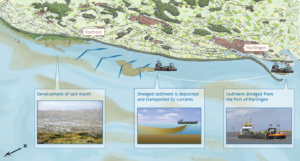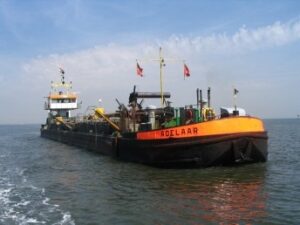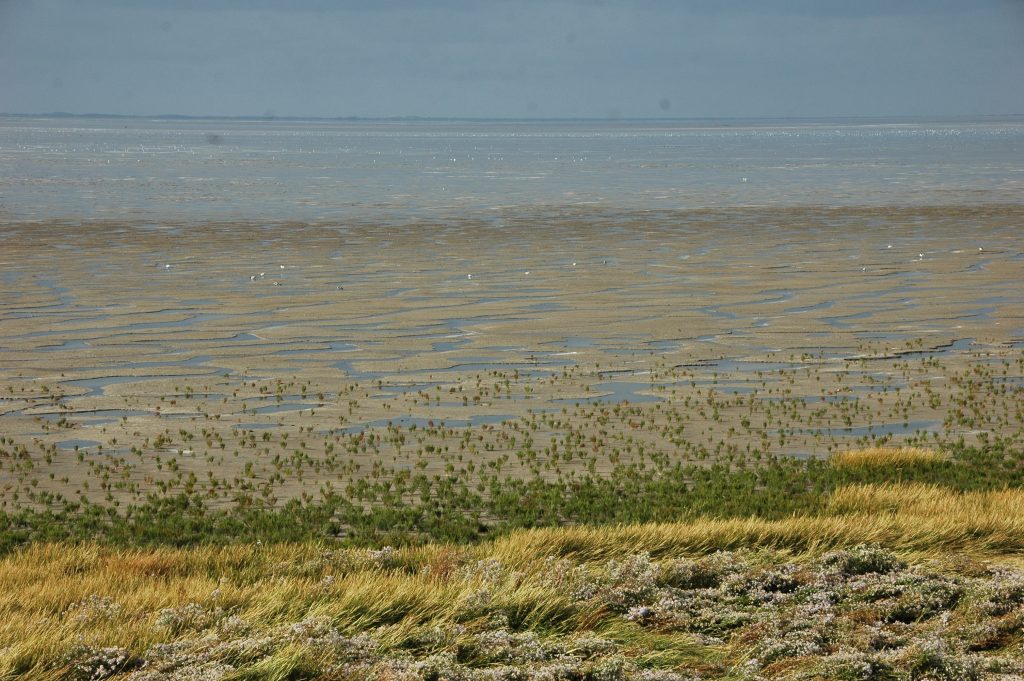Overview
The project Salt Marsh Development with a Mud Motor looks at the potential for furthering the development of salt marshes in the Wadden Sea by making optimal use of the sediment transportation capacity of ambient flows.
Title: Mud Motor Port of Harlingen, (Koehoal)
Location: Port of Harlingen, Wadden Sea (NL)
Date: 2016-2018
Involved parties: Van Oord, Royal Haskoning DHV, Arcadis, It Fryske Gea, Wageningen University, Deltares
Technology Readiness Level: 7 – system prototype demonstration in operational environment
Environment: Muddy coasts, Rivers & Estuaries, Ports
Keywords: salt mash, dredge, flow chart, mud, intertidal areas, port

The Mud Motor is built by disposing the dredged mud at a specific location from where the mud is transported by natural processes, such as tidal flow, to nearby salt marshes. The mud is used as a natural building material for the salt marsh. This strategy reduces the recirculation of dredged sediment and it stimulates the growth of salt marshes.

Traditional approaches to reduce the maintenance dredging involve disposal of dredged sediment at a location far enough offshore to limit the recirculation of dredged sediment. Other options are to dispose the dredged sediment onshore or to sell it.Traditional approaches to stimulate the development of salt marshes commonly involve structures to protect the salt marshes against waves and high tidal flows. The structures provide calm water in salt marshes and mud flats, which enables settling of the mud and growth of vegetation.
About
Approximately 1.2 million m³ of mainly fine sediment is dredged annually from the harbour basins in the Port of Harlingen to maintain navigability. The dredged sediment is deposited in a designated disposal area in the Wadden Sea near the harbour. In current operations an unknown but possibly large proportion of the dredged sediment flows back into the port relatively quickly.
This Building with Nature study suggests an alternative approach to sediment management: deposit the dredged sediment further north of Harlingen and let natural processes spread the sediment to nearby salt marshes (Mud Motor).
Mud Motor’s benefits and partners
- Promotion of the growth and stability of salt marshes, improving the Wadden Sea ecosystem
- Less recirculation towards the harbour, and therefore less maintenance dredging
- Stabilization of the foreshore of the dikes, and therefore less maintenance work on the dike.
The project is carried out by EcoShape consortium partners together with the Port of Harlingen and the local nature management NGO It Fryske Gea. The applied research project by EcoShape is coupled to a fundamental research programme financed by the Netherlands Organisation for Scientific Research (NWO) and involving two PhDs and a post-doc.

